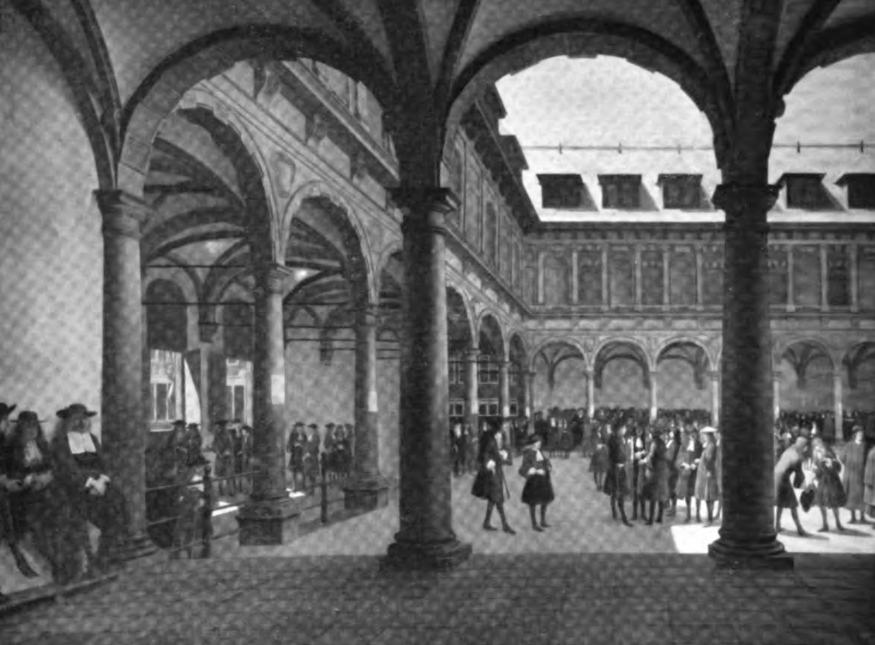Joseph De La Vega understood the riddle of markets in 1688

Computers and the information age have changed nearly everything about how we trade but so many parts of the decision on whether to buy or sell are unchanged.
The above scene is from the interior of the Amsterdam stock exchange where stocks began trading in 1611. Seventy-seven years later, Joseph De La Vega wrote perhaps the first detailed book on how to trade stocks in 1688.
It's titled Confusion de Confusiones and much of it is as relevant today as it was 330 years ago. Originally written in Spanish, it was translated to English in 1957 and still remains little known.
As the translated introduction reports, De La Vega compared the life on the exchange to a labyrinth and said participants moved in a world of darkness which nobody wholly understood. He said no pen was able really to describe in all its intricacies.
The title describes how every rational action was tied to an irrational one. He calls it a 'gambling hell'.

The book is written in an usual style where the voice of the author is given to a variety of characters but several passages stand out, including four principles on how to speculate:
"The first principle [in speculation] : Never give anyone the advice to buy or sell shares, because, where perspicacity [keenness of understanding] is weakened, the most benevolent piece of advice can turn out badly. The second principle: Take every gain without showing remorse about missed profits, because an eel may escape sooner than you think. It is wise to enjoy that which is possible without hoping for the continuance of a favorable conjuncture and the persistence of good luck. The third principle: Profits on the exchange are the treasures of goblins. At one time they may be carbuncle stones, then coals, then diamonds, then flint-stones, then morning dew, then tears. The fourth principle: Whoever wishes to win in this game must have patience and money, since the values are so little constant and the rumors so little founded on truth. He who knows how to endure blows without being terrified by the misfortune resembles the lion who answers the thunder with a roar, and is unlike the hind who, stunned by the thunder, tries to flee. It is certain that he who does not give up hope will win, and will secure money adequate for the operations that he envisaged at the start. Owing to the vicissitudes [volatility], many people make themselves ridiculous because some speculators are guided by dreams, others by prophecies, these by illusions, those by moods, and innumerable men by chimeras."
In a separate pass he describes bulls ("lovers") and bears ("contremine").
"The bulls are like the giraffe which is scared by nothing … They love everything, they praise everything, they exaggerate everything," he writes.
"The bears, on the contrary, are completely ruled by fear, trepidation, and nervous ness. Rabbits become elephants, brawls in a tavern become rebellions, faint shadows appear to them as signs of chaos," De La Vega writes.
Ultimately, he says it's best to drink from both cups but that the natural inclination in stocks is higher with the occasional fall.
"Experience has shown that usually the bulls are victorious and the bears lose out," he wrote.
His optimism was well-placed for time. The Dutch East India company's shares rose steadily for more than 200 years, albeit with plenty of volatility. By some measures, it was the largest company in history.

Perhaps my favorite line from the book is this one, the idea that you can never quit once you're involved in markets.
"It is a great error to assume that you can withdraw [temporarily] from the Exchange or that you can gain peace of mind when you cease to meet with the other speculators. If ill fate pursues you persistently, it can reach you just as well in the rocks and the forests, where lightning may strike you and wild beasts may attack you. . . . Moreover, it is foolish to think that you can withdraw from the Exchange after you have tasted [the sweetness of the honey]. . . . He who has [once] entered the [charmed] circle of the Exchange is in eternal agitation and sits in a prison, the key of which lies in the ocean and the bars of which are never opened. . . ."
Here's an online version of Confusion de Confusiones.




